Establishing an online presence is a must for small businesses, large corporations, and even individual contractors who are looking for ways to promote and share their own digital portfolios. With an online presence, maximize your reach and your ability to showcase your products, services, or ideas to any audience or demographic you wish.
Whether you are building a website for a small local business or if you are interested in expanding and scaling a brand internationally, learning about important keywords in marketing and understanding digital marketing agency keywords is essential for the best outcome possible. Without keyword targeting and an understanding of SEO, maximizing your reach and your ability to grow and scale become increasingly difficult in an ever-changing and expanding online economy.
What is SEO?
SEO, also known as search engine optimization, is a tool used by marketers, programmers, and webmasters alike to help spread the word about an existing website or domain name. When a website is best optimized for search engines, it is more likely to appear within the first page(s) of search engine results.
The Importance of SEO
Most users who access the internet today do so using a top search engine as their set and preferred homepage. The top search engines today such as Google, Bing, Yahoo!, and DuckDuckGo, provide ample opportunity for website and blog owners to gain exposure and to boost their website URL’s visibility within search engine results.
Whenever an individual searches using a top search engine, they are most likely to select a result that appears within the first page of search engine results they receive. By honing in on keywords and target marketing, you can help to optimize your website’s keywords and search terms to boost your placement within search engine results as well.
By understanding keyphrase marketing and the market keywords that are trading or most relevant to your business and brand, you can improve your website’s ranking, thus leading to more visitors, traffic, and ultimately, leads and revenue.
FACT: About 64% of marketers actively invest time in search engine optimization (SEO). (HubSpot)
The Benefits of Optimizing Your Website or Online Presence
Honing in on specific SEO marketing keywords that are ideal for your website, business, or brand can help you to spread the word about your website and its purpose. It is also a way to help establish yourself as a professional or authoritative source online, especially when entering a market or industry that is already rife with competition. Some of the most notable benefits and advantages of optimizing your website and online presence with SEO include:
- Improve your search engine ranking: Boost your website’s ranking within top search engines such as Google, Bing, Yahoo!, and DuckDuckGo.
- Establish credibility: Establish credibility and garner the trust of online users, visitors, and prospective customers when your website appears within the first page(s) of search engine results.
- Learn more: Discover more about your visitors and the audience who is visiting your website based on search terms and keywords you have targeted and optimized within your campaigns. Learn more about the demographics that respond most to your links and promotional content or ads within search engines. For example:
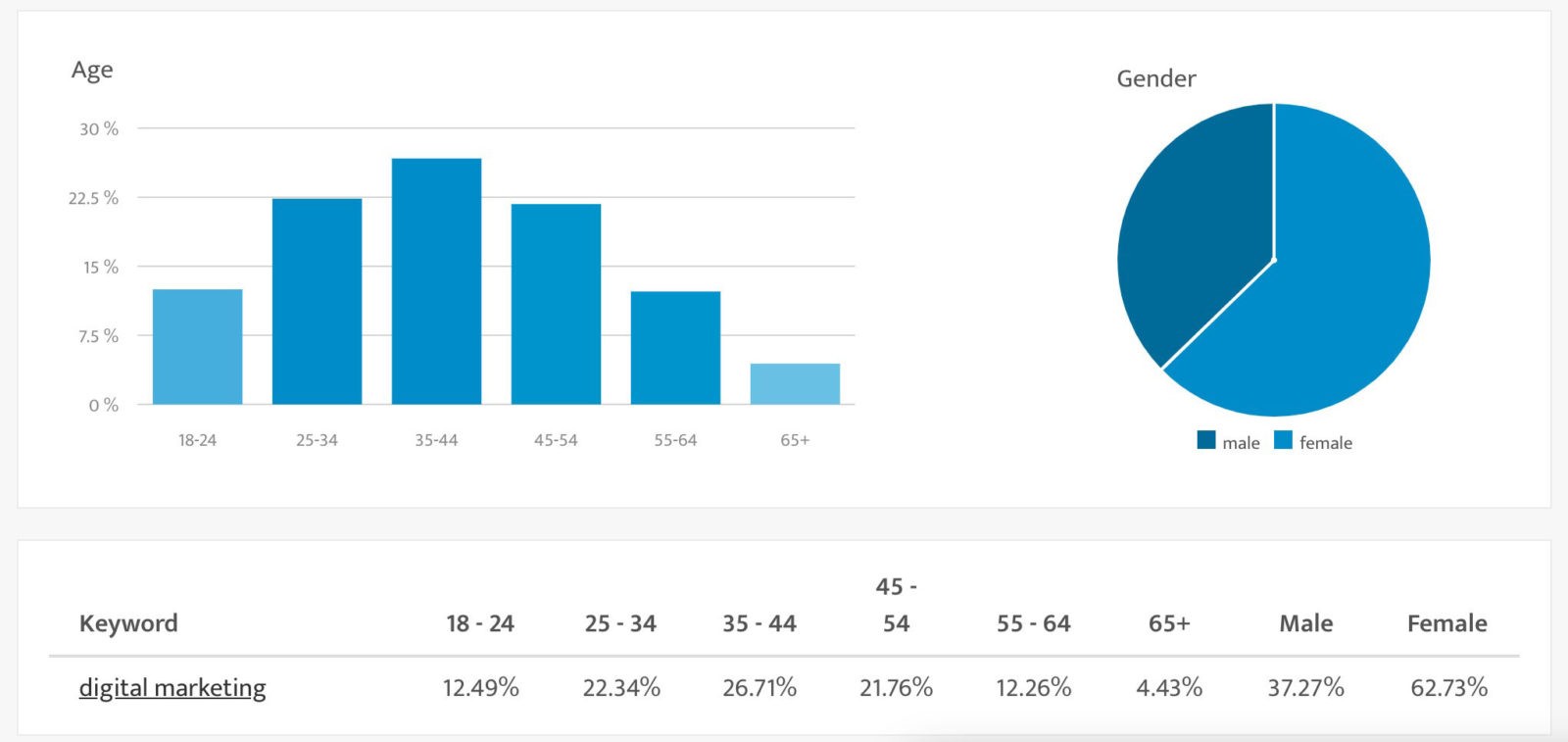
(Image Credit: Search Engine Journal)
- Keyword exploration: Tap into the most popular keywords and important keywords in marketing for your business and brand based on the market, industry, and audience you want to reach.
What is Keyword Research?
Keyword research involves researching keywords for marketing agency campaigns based on the type of products, services, or ideas you intend to share with your audience of online visitors and prospective consumers. Keyword research involves determining which words, phrases, and trends are most important, valuable, and trendy at the time of any digital campaign you plan to launch.
Selecting the right keywords for the type of content and information or products you have to offer can mean the difference between failure and success in your next online marketing campaign or strategy.
Deciding on a Keyword Type
Once you begin learning about digital marketing agency keywords and the importance of keyword and content marketing, you must decide on a keyword type that you intend to optimize and hone in on. There are currently four major keyword types to consider when fleshing out your next campaign and prior to conducting keyword and trend research in your specific market and niche, including:
- Navigation-based keywords: Navigation-based keywords are keywords that are used by individuals who are searching for your website specifically, using your domain name or the specific name of your brand and/or product(s) you offer. For instance:
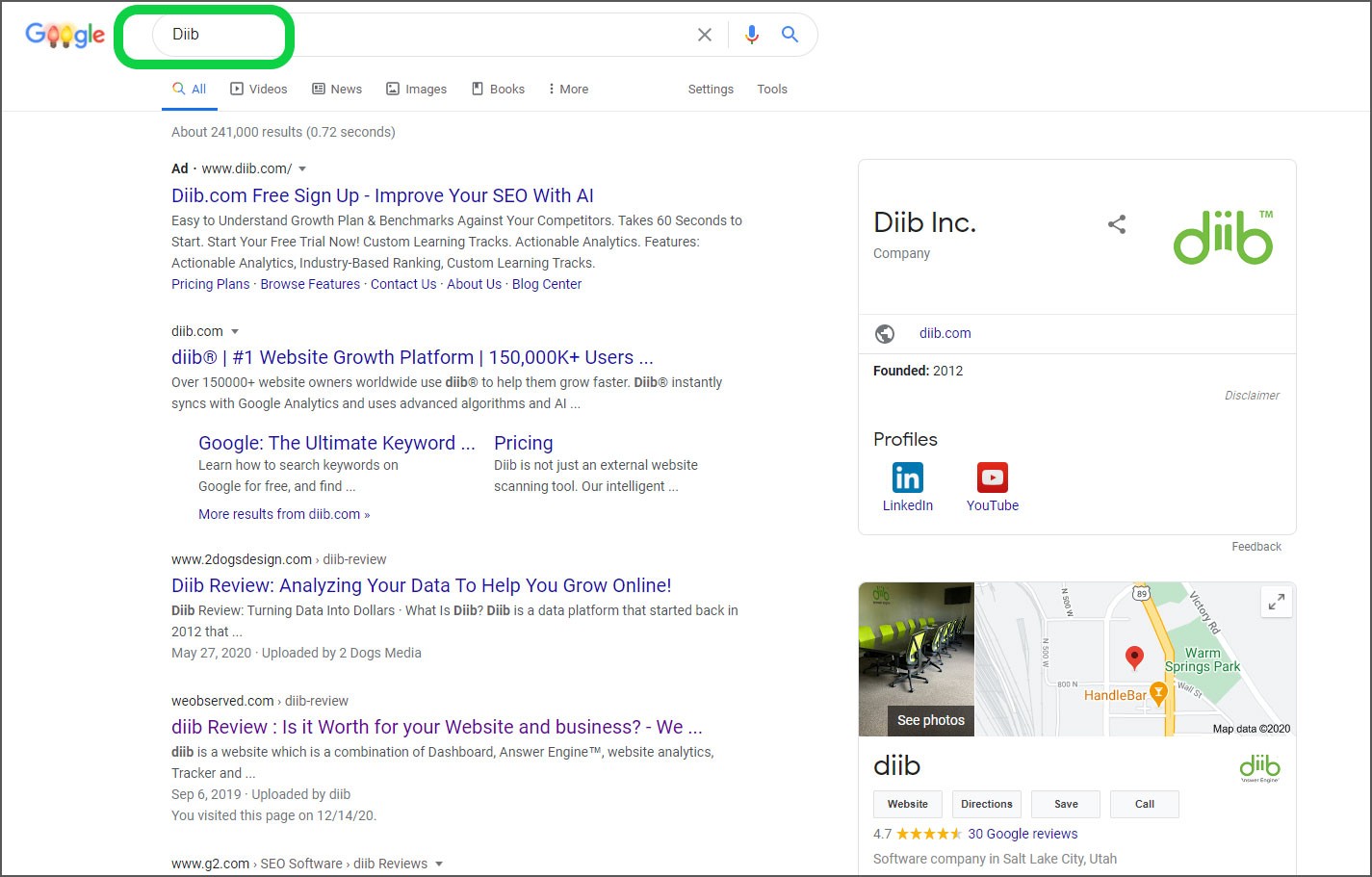
- Transaction-based: Transaction-based keywords are keywords used within campaigns to help motivate users to learn more about a product or to incentivize them to complete their purchase.
- Information-based keywords: Information-based keywords are keywords that will lead a user to answers about a particular keyword, trend, product, or problem.
- Investigation-based keywords: An investigation-based keyword is a keyword that is used to provide information to a user with the hopes of motivating them to make and/or complete their purchase.
Learning about various keyword types and why specific keywords are selected for individual campaigns is extremely valuable for any online marketing strategy.
Did You Know??? The first 5 organic results in the SERPs account for 67.6% of all clicks. What’s more, 50% of search queries contain 4 or more words (Backlinko)
Improve your content marketing + SEO in 60 seconds!
Diib uses the power of big data to help you quickly and easily increase your traffic and rankings. We’ll even let you know if you already deserve to rank higher for certain keywords.
- Easy-to-use automated SEO tool
- Get new content ideas and review existing content
- Checks for content localization
- SEO optimized content
- Built-in benchmarking and competitor analysis
- Over 500,000k global members
Used by over 500k companies and organizations:
Syncs with 
Use a Keyword Tool
Even after you familiarize yourself with what SEO means to businesses and brands today, it can be difficult to know where to begin once you start putting together your own digital marketing strategy and campaign. One of the best ways to dive right into keyword and search engine marketing is to use a keyword tool.
Keyword tools include solutions such as Google Trends and Google AdWords in addition to other CRM (customer relationship management) or trend tracking software solutions. Here is an example of Google AdWords keyword tool:
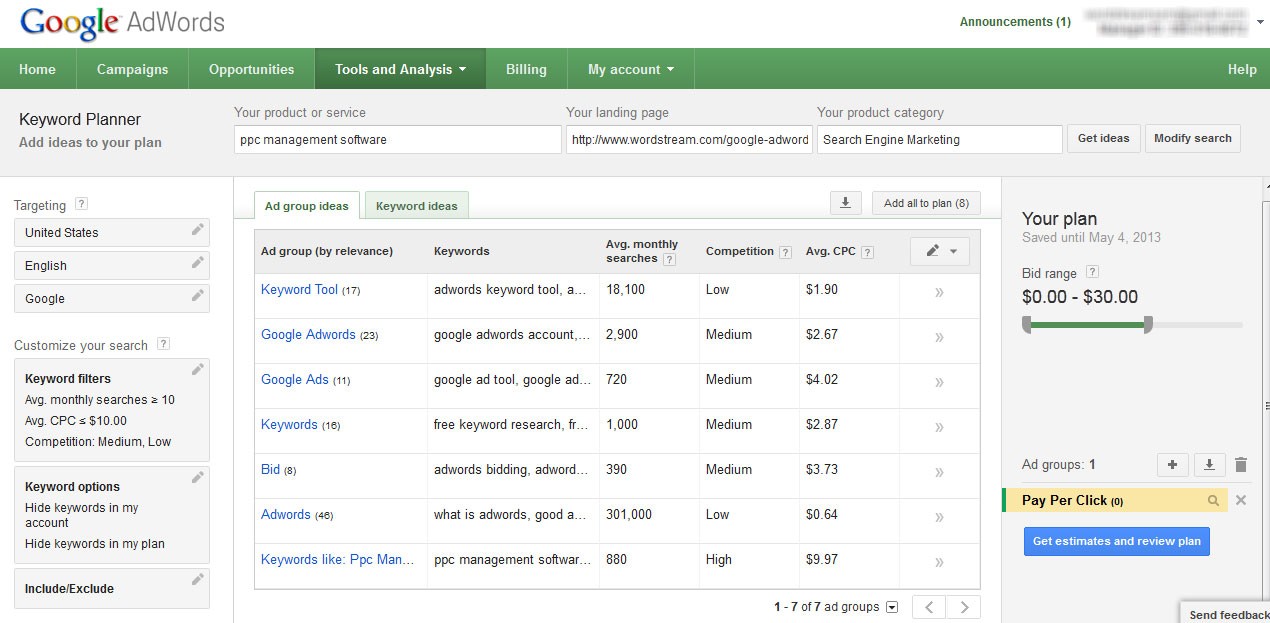
(Image Credit: WordStream)
Why Use a Keyword Tool?
Using a keyword tool is one of the easiest ways to immerse yourself into a specific market or niche online, especially if you are new to online advertising and developing digital campaigns of your own. With a keyword tool, learn more about the overall engagement of specific keywords, trends, and even long-tail phrases or terms, depending on products, services, or ideas you are interested in promoting.
Not only are keyword tools easy and straightforward to use, but they are also cost-effective. Many keyword trackers and tools are free to access and use, even for business owners.
With the right keyword tool, gauge which keywords in your niche and industry are most likely to drive traffic to your website or help you to gain new online followers. Track the recent and projected trajectory of the keywords you are currently using as well as keywords and phrases you are thinking of using in future content and campaigns you intend to launch for your website.
Discovering New Keywords and Phrases
Keeping up with the most popular keywords, phrases, and trends in any given industry is not as simple as taking a poll or simply delivering new content, services, and products. In order to remain as productive and efficient as possible, it is highly advisable to spend time immersing yourself in various areas of the market and your own online community at all times to discover which keywords are likely to return the best results.
Use Keyword Tools
As discussed above, using keyword tools come in handy for a variety of purposes, from brainstorming new content ideas to launching massive online campaigns to promote your business and brand. One of the quickest ways to learn more about popular and relevant keywords as they pertain to your own industry is to do so with the use of keyword tools such as Google Adwords as well as Google Trends. The image below shows an example of Google Trends:
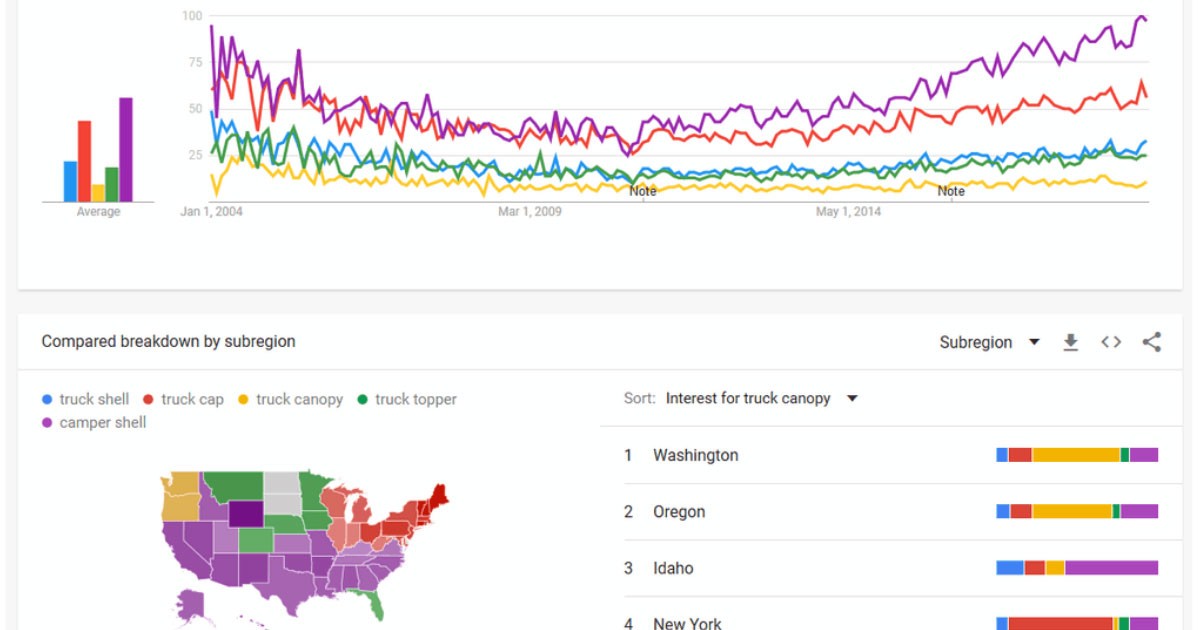
(Image Credit: Bruce Clay)
Join and Follow Competitor Websites and Pages
If you are not feeling creative or if you are unsure of where to begin when it comes to selecting keywords and creating relevant content, consider joining and following competitor pages and websites. Following your competitors online is not only a way to gain valuable insight into the marketing and advertising campaigns they are using, but it is also a way to get to know more about the followers and users of the communities themselves.
Joining and following competitor pages and websites is also a way to discover which content types are most engaging and result in the highest number of shares. If one of your SEO and marketing goals is to drive more traffic and engagement to your website, blog, or social media presence, following your competition is a must to ensure you are on the right track at all times.
Immerse Yourself in Relevant Online Communities
Another way to learn more about the best SEO keywords for your own market is to immerse yourself in relevant online communities, aside from your direct competition. Relevant online communities may include message boards and forums to online groups with the use of social media platforms such as Facebook and Discord.
Immersing yourself in relevant online communities can help you to learn more about the wants and needs of the audience you wish to reach. It can also provide you with deeper insights into the keywords and phrases that are most often mentioned, discussed, or asked about by users of said communities. Spending time immersing yourself in different digital communities that have the same audience as your own target audience is one of the best ways to gain valuable knowledge about your own SEO marketing strategy and campaign plans.
Optimizing SEO Keyword Campaigns
Once you have a basic understanding of the audience you intend to reach, platforms you wish to use, as well as metrics you intend to measure and monitor, you can begin optimizing your SEO keyword campaigns. Optimizing your next SEO keyword campaign can begin once you have defined your audience, set goals, and implemented a monitoring system to track the results of each of your campaigns individually.
Define and Set Short and Long-Term Goals
Before you can launch a brand new SEO keyword campaign for any business or brand, it is imperative to define and set both short and long-term goals. Without goals, knowing when you are reaching levels of success becomes increasingly difficult, if not impossible.
Set both short and long-term goals before launching any online campaign, including those that involve SEO keywords and boosting your ranking within search engines. Ask yourself the following questions while you are in the process of setting the goals of your next online campaign:
- What is the purpose of my SEO campaign? Am I interested in attracting new visitors and readers, or am I looking to generate leads, sales, and ultimately revenue? Do I want to increase my social media following, or am I more interested in receiving the additional newsletter and email subscribers?
- What demographics am I looking to target with my SEO keywords and the phrases or trends that I am targeting? Am I targeting an international user base or am I focused on geo-targeting with the SEO keywords I choose to focus on?
- How are my users most likely to discover my campaigns or search for the SEO keywords I am choosing to highlight and promote?
- Who is most likely to benefit from the type of content, products, or services I am sharing with my audience?
- What tools or software solutions do I intend to use in order to monitor the success of keyword campaigns and any digital campaign I launch?
- Are there specific measurables and metrics that are most important to me with the individual SEO campaigns I intend to launch?
Target Segmented Audiences
If you want to hone in on a specific audience or group of users, you can do so by targeting segmented audiences you have identified and/or created yourself. A segmented audience may include users of a specific age range, gender, or even users based on a specific location and region. It is also possible to create segmented audiences with the use of the following criteria:
- Previous website visitor
- Interests and hobbies
- Previous customer
- Abandoned shopping cart
- Referrals/recommendations/referral link
- Newsletter/email list subscriber
- Current social media followers and fans
Choosing to target users based on specific demographics and other criteria can help you to optimize any SEO-based marketing campaign you launch, regardless of your preferred platform(s) and the business or brand you are promoting.
We hope that you found this article useful.
If you want to know more interesting about your site health, get personal recommendations and alerts, scan your website by Diib. It only takes 60 seconds.
Use A/B Testing
Using A/B testing is also imperative for any digital marketer, whether you are simply looking to drum up traffic and visitors or if you are looking to expand your website and brand on a massive scale. A/B testing is the process used to monitor and compare data received from multiple campaigns that are running simultaneously. For example:
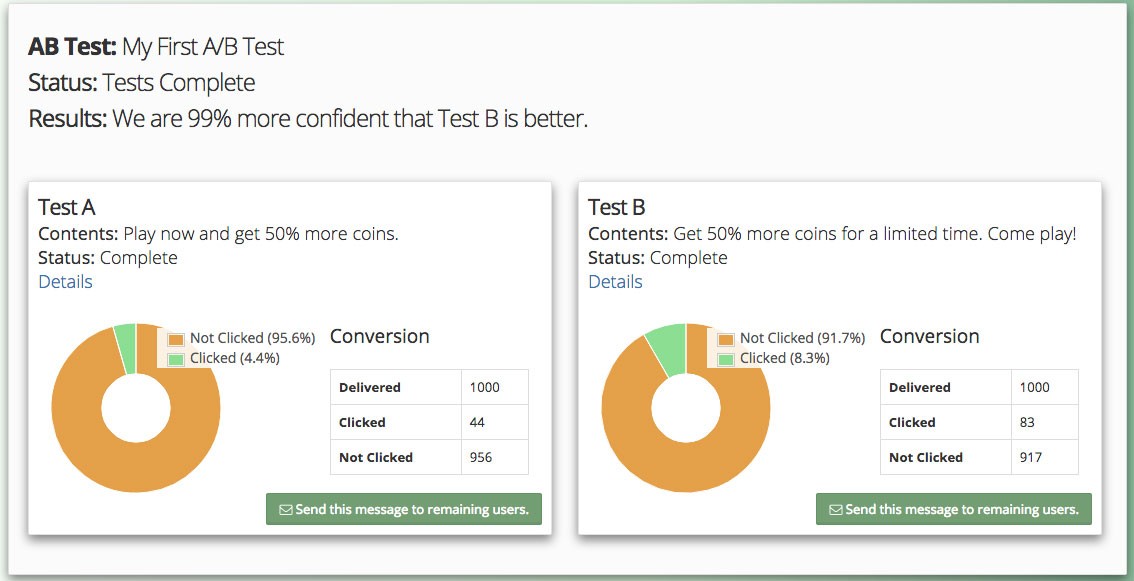
(Image Credit: OneSignal)
With A/B testing, marketers may launch two campaigns using the same images, but different headlines or CTAs, or calls-to-action. In some cases, a marketer may opt to use the same headline and CTA, but swap the image for even greater insight into what is working and what is falling short of expectations.
A/B testing is one of the most valuable tools to learn more about how an audience engages with and responds to individual ad campaigns and promotions. With A/B testing, discover what works best to reach your audience and to resonate with them without wasting time or overspending on your ad and marketing budget. Using A/B testing is also a way to better understand which visual and textual language(s) works best at reaching your audience to drive clicks, sales, and ultimately, revenue to your business and brand.
The Importance of Data and Analytics
Collecting data and monitoring analytics goes a long way when it comes to SEO marketing. Using the data and analytics you collect is a way to determine which marketing efforts are failing and which ones are performing as planned or even better than intended or expected. By using tools such as Google Analytics, it is much easier to gauge which marketing campaigns and strategies are truly resonated with any audience you have in mind. Data and analytics can make or break a business in any digital sphere and market today. Here is an example of a Google Analytics page:
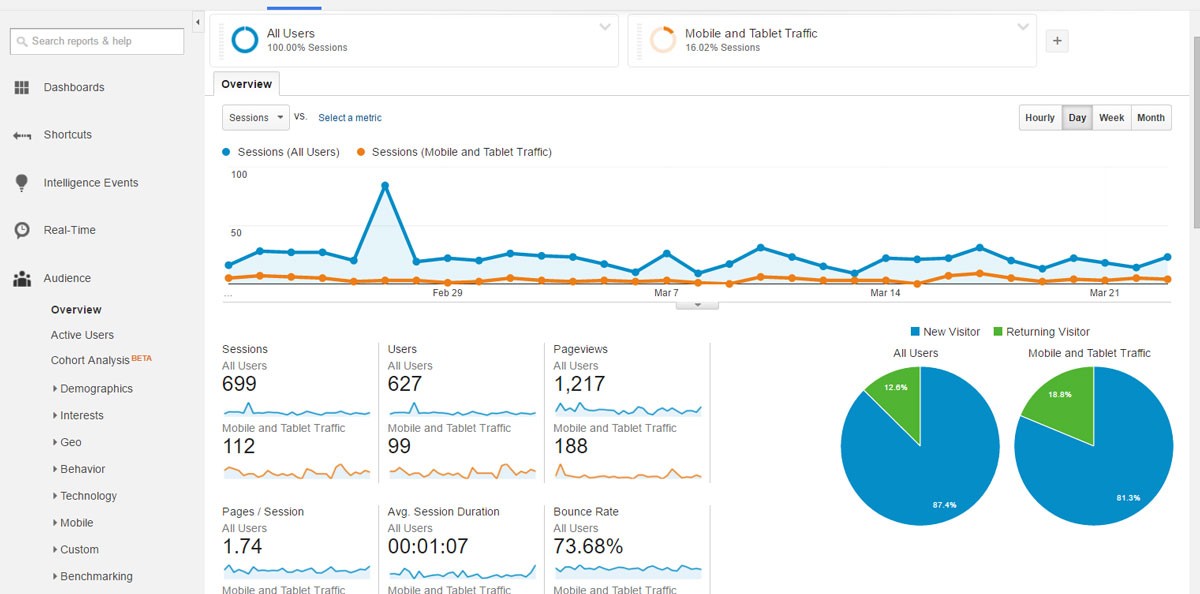
(Image Credit: Crazy Egg)
Immersing yourself in keyphrase marketing and familiarizing yourself with top market keywords can help you to stay ahead of the curve and competition in any niche or industry you represent. By learning about keywords for marketing agency tips and better understanding marketing keywords will help you to stand out, captivate your audience as you solidify your business or brand’s position in your chosen market.
Diib®: Research Your Marketing Keywords Today!
With the right SEO and keyword research knowledge, outshine and outperform your competition while garnering the trust and loyalty of your followers and future prospective customers or clients. Partnering with Diib Digital will give you a wealth of information you can’t find anywhere else. Here are some of those features:
- Keyword, backlink, and indexing monitoring and tracking tools
- User experience and mobile speed optimization
- Bounce rate monitoring and repair
- Social media integration and performance
- Broken pages where you have backlinks (404 checker)
- Technical SEO monitoring
Click here for your free scan or simply call 800-303-3510 to speak to one of our growth experts.
FAQ’s
A branded keyword is a search that includes your website’s name or the brand of your product; something unique to your website or domain.
There are three types of keywords described by their length:
- Short-tail keywords
- Mid-tail keywords.
- Long-tail keywords.
A keyword strategy is defined as the string of decisions you take following a keyword research campaign. This includes the content you plan and tracking the results of your content.
LSI keywords are search terms related to the main keyword you are targeting. They help to support your content and add more context to make it easier for both users and search engines to know what your content is about.
We recommend including one keyword for each 200 words of copy. In other words, if a web page consists of a single, 200-word paragraph, it should contain no more than one keyword.



